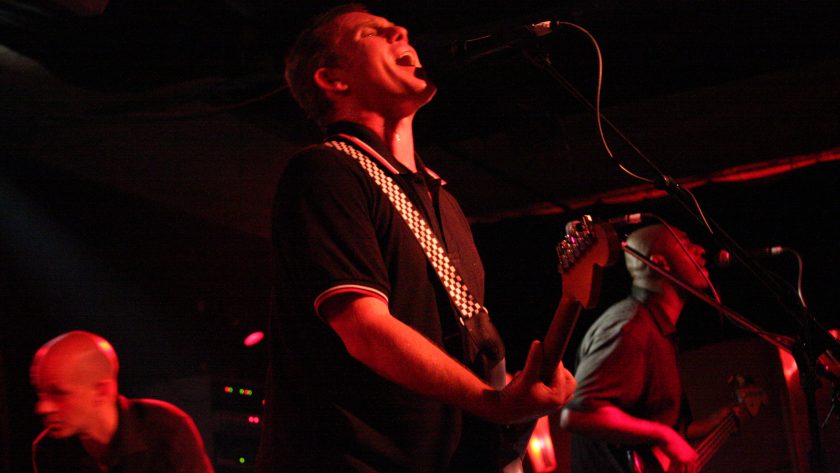Since this is a tale about control, let’s start by stopping.
Pull your eyes off the page and scan the horizon. Off in the distance they sit (no, wrong word, they LOOM), down dusty roads, on the outskirts of metropolitan areas, turning open fields into rigid angles of steel.
Never too far, these man-made erector sets clutter the countryside.
Can you see them?
High tension wires.
Dangerous but necessary, without them there is no light, no sound; they transfer power and eviscerate skylines. Some say they don’t need to be there, that the energy belongs underground (yes, the underground!), but it’s too late for that now. They’re here, they’re established. Get used to them.
Fine you say, but what does this have to do with buying tickets to a Phish show?
Everything.
The future of live music, with its verve and promise, is perched to become the charge of such monoliths.
And many a fan may be left in the dark.
“The last conglomeration of the monopolies is trying to stick together and find the last few ways to gouge something,” said Dave Wakeling, the leader of not one but two noted bands (The English Beat and General Public). “There’s starting to be less and less places in the music industry to make money off of. Just like carrion crows, you’re going to end up with more concentration on the few corpses that remain to pick at.”
Carrion crows. They nest atop high tension wires.
• • •
In three decades traversing the music business, Wakeling has seen it all.
The 53-year-old Brit has been on stages big and small, playing in front of tens of thousands and sometimes just tens. Much of the industry has changed in those 30 years — once a realm inhabited by the connected few, the personal computer and Internet opened the gates to everyone, whether you want to listen, create, or simply learn about music.
“The old model we had of the music industry may be dead, but the music has never been more alive,” Wakeling said as he prepared to take The English Beat out on a lengthy American tour. “It was all so sown up and cut and dried when I started, and certainly who you knew or who you could meet could make a whole big heap of difference. Monopolies were guarded very tightly and to be invited into the monopoly was much sought after. It’s always been a mixture of sharks and angels attracted to the music business and I think it’s all for the better now. The whole thing has fallen to bits. It deserved to.”
Amid those bits lie remnants of an industry’s past – concept albums, cassettes, large record companies, David Lee Roth – while what arose remained lean and compact. Small, tightly-run record labels, CD collections stored in electronic boxes the size of your hand, the music itself reduced to one or two downloadable megabytes.
Everything got smaller. But not the live spectacle.
Concerts became the behemoth. Amphitheaters of steel built-in empty lots, showcasing lights of all colors and sounds to deafen the sky. Lead singers displayed their faces and egos on television screens 200 times their size (or 100 times, in Kanye West’s case). The crowds grew, the venues grew, and the tickets prices — oh my did they grow. A show that was once $35 became $100 (thank you Eagles), then became $350 (thank you, Paul McCartney).
And yet for the last decade, this growth was steered by the power of two — Live Nation (the world’s largest live music company) and Ticketmaster (the world’s largest live entertainment ticketing company).
Now they want to be one.
One company controlling the tickets, the venues, the promotion, the secondary ticket market as well as many of the world’s top musical acts.
Now that’s power.
• • •
Here’s where we’re at.
In February of this year, Ticketmaster and Live Nation announced they wanted to merge and become Live Nation Entertainment, a full-service company uniting the largest ticket distributor with the largest concert promoter. The two entities spent years fighting, as Live Nation ended its contract with Ticketmaster in 2007 — which gave it sole control to sell tickets at Live Nation events — and started a ticket service of its own. Ticketmaster countered, buying Front Line, one of the world’s largest artist management companies, and TicketsNow, a secondary ticket sales subsidiary (read legal scalpers).
A few years ago, Live Nation started signing several top artists (Madonna, Jay-Z to name a few) to “360-deals,” giving them multi-million dollar payments upfront in exchange for future percentages of their recording, touring and merchandising sales.
The fight proved costly, as a weakened economy saw the companies’ sales and stock prices plummet.
What could save them? A gathering of the giants.
“This combination will drive measurable benefits to consumers and accelerate the execution of our strategy to build a better artist-to-fan direct distribution platform,” Live Nation’s Michael Rapino said in a statement after merger plans went public. “This merger, and the resources of these combined companies, will create a new dynamic and unique creative platform of choice for fans across all levels of the live entertainment experience,” Ticketmaster’s Chief Executive Irving Azoff said.
Sounds good?
“Monopolies are inherently bad,” said longtime rock critic Jim DeRogatis, who has written for Spin, Rolling Stone, and now resides as pop critic for the Chicago Sun-Times. “I miss the corner coffee shops. I like Starbucks I drink Starbucks, as a writer, I drink coffee by the boatload. But I would like to have a choice. Whether the product is good or bad it’s just no choice and that’s not good for the consumer. The lack of competition is never good for the consumer.”
In an analysis of the merger released by the American Antitrust Institute in April, James D. Hurwitz, who worked with the Federal Trade Commission, wrote: “Live Nation Entertainment would be a vertically integrated enterprise with dominance or substantial power on five market levels. The new entity would, therefore, be able to use its strengths in some markets as leverage to gain customers or compliance in others. This vertical integration would effectively frustrate new entry because, as a practical matter, it would require firms seeking to compete seriously against Live Nation Entertainment to enter the industry on several levels at once. The second factor is that the merged entity would likely enjoy market power not just as a seller but also as a buyer. In essence, the company’s market dominance would benefit it in both ways.”
I’m not sure what it means either, but it certainly doesn’t sound good.
• • •
Face it, the arena concert-going experience is a pain in the ass.
If you’re lucky to get tickets to the concert of your choice before a) it sells out, b) Ticketmaster times out your computer before you can make a purchase or c) Ticketmaster sends all the best seats to its secondary-selling site where you can buy tickets for five times the base price (a practice which reared its crooked head with Bruce Springsteen tickets earlier this year), you’re still left paying a small mint for a few hours of entertainment in what may be crappy seats.
Of course, for the convenience of buying tickets online and printing them out yourself, Ticketmaster charges you a fee.
“We’re kind of on the cheaper end of the tickets and I’m grateful of that,” Wakeling said. “We do hear it sometimes, where you might have a $20 ticket and by the time you finished buying it you might be paying $32 or $35 for the same damn ticket.”
“What is convenient?” said Iain Bluett, president of Atlanta’s Ticket Alternative, a company fighting Ticketmaster for a small piece of the ticket-selling pie. “The convenience was allowing you to buy the ticket online? They have no competition and they built this huge infrastructure and that fee just kept creeping up and up. If they’re so worried about their fees why are they charging you $2.50 to print out the ticket yourself? Your printer, your paper, $2.50 to do that? Ohhh, they have to pay for that technology. Well, you know what, I don’t know how much technology costs but it’s not that hard to print out your own ticket.”
So you paid for the tickets, the fees, now it’s time to go to the show to have some fun.
“You’re treated like a piece of shit,” DeRogatis said. “With Live Nation, I resent being treated like cattle. Whether it’s the added parking fee which they do per ticket – four people carpool out to a show and each of them is paying $15 to park? $7.50 for a beer? $5 or $6 for a hot dog? And then in between, they have the audacity to advertise to me? I paid $50, $60, $100, $250 for a ticket, I just paid $60 for the whole car to park in the middle of nowhere in a dirt field. You’re lined up, they search your bag and God forbid you brought in a bottle of water – throw that away because they’re going to sell you one for $5. The experience is an inferior one.”
This will change with the merger, right?
Trent Reznor, the mastermind behind Nine Inch Nails, is quite vocal about the merger, especially in what happens to ticket prices if it were to go through. On the NIN Web site, Reznor wrote a scathing review of the events, with a harbinger of things to come.
“My guess as to what will eventually happen if/when Live Nation and TicketMaster merges is that they’ll move to an auction or market-based pricing scheme – which will simply mean it will cost a lot more to get a good seat for a hot show,” Reznor writes. “They will simply BECOME the scalper, eliminating them from the mix.”
“We’re moving to this world where you have to be filthy fucking rich to see a concert and if you’re not you’re out of luck,” DeRogatis said. Auctioning off tickets “is absolutely what they’re going to do.”
“You’ll start to see dynamic pricing,” Bluett said. “You’d have thresholds. You would sell the first couple of thousand tickets at $100 and then once they sell out you put the tickets up to $120, very much like the airline industry. It gets more complicated because the artists are looking to get more money out of it as well.”
Surely the artists will put a stop to this ticket-selling plan.
• • •
Bono didn’t know.
When asked by DeRogatis about the of Ticketmaster/Live Nation merger, the bespectacled honorary knight, who seemingly knows something about everything, was clueless to the news.
“A charlatan and a fraud,” DeRogatis said of Bono. “If you just made $50 million from somebody, you would know.”
In fact in 2008, Live Nation signed U2 to a 12-year touring deal worth $100 million. And therein lies the next dynamic piece of this improbable puzzle – what are the artists to do?
There are vocal barbs on both sides of the issue. Many top artists signed deals with either Ticketmaster or Live Nation, and their silence is deafening.
“I think there is a certain amount of artists spitting in the face of the fans,” DeRogatis said. “When Paul McCartney was 15 or 16 he was able to see Little Richard in Liverpool for the equivalent of a dollar or two and it changed his life. Now some kid who’s sitting in a basement learning to play those Beatles songs, unless he has access to his dad’s gold Amex card at $350 a ticket, can’t see that experience. Paul McCartney has the right to charge whatever he wants, but don’t you tell me you’re an artist anymore. You’re not. This is now some capitalistic cash-in enterprise. How much money does everybody need for 90 minutes of work?”
Springsteen fans bellowed after Ticketmaster sent tickets to his show to its secondary selling site, TicketsNow. The Boss himself got involved, scolding the company for its practices and demanding they stop: “The one thing that would make the current ticket situation even worse for the fan than it is now would be Ticketmaster and Live Nation coming up with a single system, thereby returning us to a near-monopoly situation in music ticketing . . . the abuse of our fans and our trust by Ticketmaster has made us as furious as it has made many of you.” Springsteen wrote on the band’s official Web site. Ticketmaster relented and apologized.
But then there’s Billy Corgan, Smashing Pumpkins’ frontman, who wrote to a U.S. Senate Committee earlier this year that “the combination of these companies creates powerful tools for an independent artist to reach their fans in new and unprecedented ways, all the while restoring the power where it belongs.” Corgan, as it turns out, is managed by Azoff.
“It’s starting to look a little less appropriate for $150 or $1,000 stadium seats tickets to go on and watch a band that’s in front of television screen with the singer dancing and miming their latest,” Wakeling said. “It’s becoming to appear a bit pretentious and particularly in this social clime when people are losing their jobs, their houses, losing any sense of hope for the future. It’s as though the artists have in some ways separated from the people they’re meant to reflect on and service.”
“I know Ticketmaster makes a lot of money,” Tim Mahoney, lead guitarist of 311 said. “To charge for a ticket now, most people buy it online, but the cost for that service charge just seems like a ton of money. I know our band; we don’t get any of that. It’s not like the bands or artists are getting any sort of cut of it – it interests me where all that money goes.”
In the end, the artist will set the price at what the people will pay.
And they’re paying.
“If I was in a band like Coldplay and U2 and I heard that people weren’t going because of the price, I would do everything in my power to change it,” Bluett said. “Unfortunately there are 80,000 other people at the Georgia Dome who don’t care and suck it up and say ‘Well that’s what it is, screw you,’ click and they bought the tickets. We all do it.”
• • •
What, if anything, is being done? As the economy continues to falter while tickets continue to rise, is anyone paying attention?
Some of the country’s larger festivals remain a great bargain, and all are allowing people to pay on layaway. April’s Coachella festival (The Cure, Paul McCartney, Morrissey) checked in at $269 (or less than a single top-tier seat for one McCartney show) to see more than 100 bands during the three-day event. June’s Bonnaroo (Springsteen, Nine Inch Nails, Beastie Boys) charged $250 for the three-day festival, while August’s Lollapalooza (Depeche Mode, The Killers, Jane’s Addiction) runs $190.
And Bluett, for one, is trying to tackle the dreaded convenience charge. Ticket Alternative, handling between 150 and 400 venues nationwide in usually smaller venues (such as The EARL and Smith’s Olde Bar in Atlanta), charges less than half of what Ticketmaster does.
“We only make money if we sell tickets,” Bluett said, “so we work really hard for our venues to help them sell tickets.”
Of course the merger can only help him, since the overwhelming presence of one company could spur venues to look for alternatives.
“It’s actually a great thing for us if it goes through because a lot of the smaller venues are looking now to jump ship like this is the final straw,” he said. “It’s a bit of a win-win, lose-lose for us. On one hand, I don’t want it to go through because consumers have a hard enough time getting good deals on buying tickets and the exorbitant fees those companies charge are outrageous. On the other hand, if it does go through it could mean great things for us because it’s going to push more promoters to look for other alternatives which is where we step in.”
But the billion-dollar question remains: Will the merger go through?
Bluett sees it happening, though with some concessions.
“Ticketmaster is going to be forced to sell TicketsNow, and if they do that I don’t think there’s any reason why it wouldn’t go through,” he said. “Those are a complete conflict of interest, how on Earth anyone ever let that go through blows my mind. But if Ticketmaster does that, then they’ll likely merge with Live Nation.”
Members of the U.S. Congress and the Justice Department are looking into the merger, and some have vowed it will not go through. Of course, the winning of mergers such as this depends on how deft the companies are at playing political poker — and Live Nation has a face card in the hole.
“I think it’s a 50-50 shot, I think this is a really bad time to be selling the American public this argument of bigger is better,” DeRogatis said. “On the other hand, the Live Nation board has a really interesting fellow on it named Ari Emanuel who happens to be Rahm Emanuel’s brother.”
Who is Rahm Emanuel? He’s President Barack Obama’s Chief of Staff.
Live Nation with a straight to the king.
• • •
Let’s stop where we started.
For fans of the underground, none of this matters much. Clubs and bars were never tied to Ticketmaster and Live Nation, and likely never will be. The underground, after all, is the future before anyone is aware of it, and monopolies are never too good at seeing much past their balance sheets.
But the window of opportunity to see bands before they ascend to a new level could be closing faster by the day. With controlling interest in all music matters, the merged companies could seek 360 deals with smaller, lesser-known bands to join their cadre of superstars. Suddenly the up-and-coming band you wanted to see before it was big has reached the land of $50 tickets and $9 beers.
The power of live music has never been more important, or valuable, as it is now. There’s a belief that if the merger goes through, live music’s best of the best (and maybe even its middle of the pack) will be reserved only for the affluent and connected.
And those anchored amphitheaters, much like the high tension wires they sit aside, will be forever seen but never touched.
“The thing that is old as mankind itself is the traveling troubadour who goes from village to village with his mandolin, puts out his hat and if he’s any good he winds up with a couple of loaves of bread and pennies,” DeRogatis said. “If he’s not, he better become a blacksmith.
“People talk about cybersex, but it’s still just jerking off. It’s not as good as the real thing. The one experience that cannot be duplicated in this digital age is sitting in a room with a musician you admire and he or she is playing this incredible music. That remains incredibly valuable – that may be the only part of the music industry that is still viable. And to have that in the controls of one company is outrageous.”




